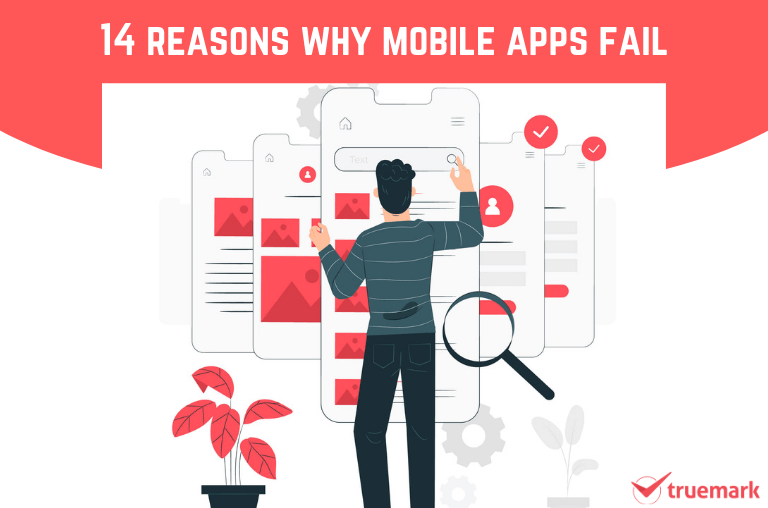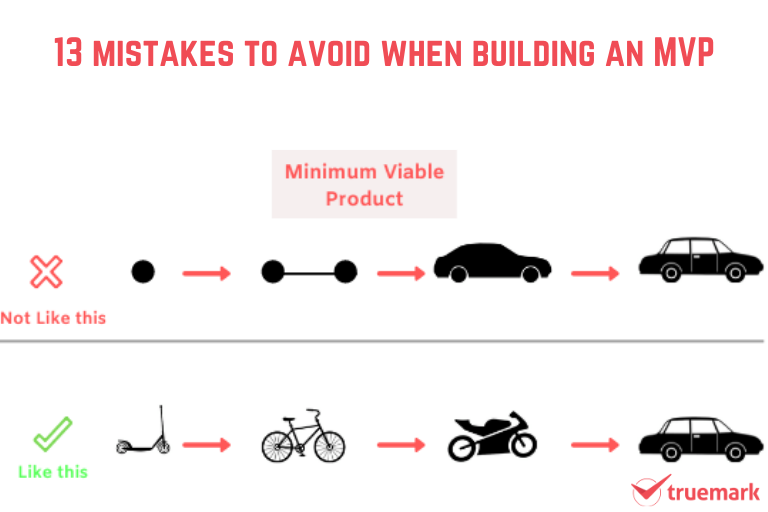According to Statista, there are 3.48 million Android apps and 2.22 million iOS apps. And it is increasing because thousands of apps are released every month on the App Store and Google Play Store. Despite this, many don’t even go live, and some are discontinued after being published. Wondering why mobile apps fail?
Not every app gets successful. About 80 percent of apps fail. The users either abandon them after first use or because of UI, not being engaging, etc.
So, why do mobile apps fail? What does it take to make it popular and successful? There are several reasons why it happens. So, below, we have listed several factors that lead to failure.
14 reasons why mobile apps fail
Little or no research about the target audience
When it comes to building an app, the most important is understanding whom you are building your app for. However, sometimes, business owners fail to understand their audience. They go for the sake of profit maximization. While it is the truth, it is also important to know your audience. Without them, you can’t make better decisions.
Without knowing your audience, their behavior, tastes, likes, dislikes, etc., you are building an app that is sure to fail.
Moreover, business owners finalize their decision based on assumptions sometimes. They don’t validate their ideas, which is the foundation of developing an app. How do you know users will love your app and be successful? On what basis are you so sure? Without thorough market research, it is impossible to develop an app that fulfills their needs and solves their problems.
Little or no research about the target audience shows your incompetence and foolishness. You are literally walking towards your failure. So, to prevent this, you need to study the market and identify your users.
Lack of clear requirements
The precise requirements help you develop a roadmap, project scope, make a proper estimation, etc. However, sometimes, the business owners are unaware of what they actually want. They fail to understand their audience, which prevents them from identifying requirements, app’s features, etc.
There are times when it becomes too technical for a non-technical person to understand everything. However, it doesn’t mean you can’t continue the app development. At least, you should know what you are building, what you need, whom to target, etc. For that, research is very crucial. Lack of study about the market and target audience prevents you from identifying the requirements. So, it is essential to do that.
Poor estimation
Poor estimation is another significant reason why mobile apps fail. Developing an app doesn’t come cheap. Besides the development process, there is the cost of maintenance, optimization, content, etc. However, business owners fail to estimate their budget. Sometimes, the expense becomes too great to handle. Without any funds, the project gets delayed or completely shut down.
Not only from the side of the owners, but the developers are also to be blamed sometimes. Because of poor estimation from their side, the project goes behind schedule. By this time, saying that similar apps won’t emerge in the market can be delusional. As a result, it gets all the glory, and your app is overshadowed by it, which leads to failure.
Besides, even if you start the development process, there is a high chance it will not be successful due to a lack of proper estimation. So, it is necessary to examine your resources first.
Fail to solve problems
Are you sure your app will solve the user’s problems? Is it ready to be deployed in the real world? Some apps don’t have a very bright future. They are sure to fail. Why? Because sometimes, business owners develop an app without considering the user’s pain points. They don’t research well about the audience that leads to such a disastrous situation.
If your app doesn’t solve real problems, then no one will buy it or use it. Without thinking much, the business owners develop an app that the users don’t need. Such apps become useless for them.
So, first, identify your target audience and their pain points. Then, ask yourself how you can solve their problems with your app.
Ignoring platform
Platform plays a significant role in developing an app. If users are on iOS and Android, is releasing your app only for desktop a wise decision? Obviously, no. Selecting the correct platform for an app is as crucial as other factors mentioned here.
Besides, it is always important to be where users are. According to Statista, in 2020, 109 billion mobile apps were downloaded from Google Play. And it is expected to be 187 billion by 2025. Before developing an app, you need to have complete knowledge about the platform you are targeting. Most importantly, you need to target major platforms if you are aiming to reach a wider audience.
Whether you go for Android or iOS, or any other platform, be sure to be knowledgeable about it.
If you ask us, it is best to go cross-platform. As its name suggests, your app will work on multiple operating systems with the same code meaning the same development time. And if you are still confused, Truemark will help you develop a cross-platform app. With 5+ years of software development experience, Truemark has developed numerous apps, working on various platforms successfully.
Device incompatibility
With each platform comes different challenges. One of them is device incompatibility. Whether you go for Android or iOS, your app should be responsive. It should perfectly run no matter the device’s OS or size. However, sometimes, it fails to do that.
Sometimes, the quality of images, videos, buttons, etc., differs from one device to device. Sometimes, the users have to pinch the screen to surf an app. It really annoys users when apps aren’t responsive.
Moreover, the apps should be compatible with most versions, if not every. Otherwise, not every user gets to use the app. Those who find the app device incompatible and face the above issues will uninstall it immediately.
So, it is necessary to check the app’s responsiveness and device compatibility during and after the development.
Lack of coordination and communication
Miscommunication between the business owner and the development team is another leading reason why mobile apps fail. If a business owner is unable to convey requirements, then the results deviate from the expectation.
The incomplete information and the disrupted flow prevent the development team from developing a mobile app successfully. They will create a different app entirely. So, it is necessary to have proper communication between business owners and the development team.
At Truemark, we communicate with the clients regularly. We have dedicated communication guidelines and channels to keep the flow of the information smooth. Moreover, we include clients in the development process to make sure the app meets their requirements.
Lack of innovative ideas
If you develop an app with features and interface similar to apps available in the market already, it will surely fail. If the other app is solving the user’s problems, why will they use your app? You are doing nothing unique. Someday, it will backfire on you.
The market is full of countless apps with similar features. What’s the difference between you and the others? That is what users watch out for nowadays. Even if the users’ pain points remain the same, the main factor is how you approach solving those issues.
If you have a unique idea that will solve users’ problems, it is best to invest your time and resources and implement those ideas. This way, you will have more opportunities to succeed. Otherwise, you are doing nothing new.
So, it is necessary to research the apps available in the market, find their strengths and weaknesses, and identify your own unique selling point.
Poor user experience
52% of customers will stop engaging with a business due to poor mobile experience. 65% of users state bad user experience impacts their opinion of a brand. Why? Because nowadays, people don’t just want features, they want a better experience as well.
When users find a mobile app too complicated to use, crashes more often, loads very slow, too many ads, etc., it will create frustration, leading them to uninstall it immediately. They want a seamless journey when using an app. If it isn’t the case, they will switch to another one.
If a company wants users to use its app repeatedly, then it needs to develop an app considering how it will benefit customers and make their journey smooth.
Miscalculating the features
Sometimes, business owners miscalculate the features, which leads to mobile app failure. They either add too many features, making it too complicated for the user, or too few features, making it less engaging.
The users tend to uninstall an app if the app is lacking in features they need. So, more features, more popularity is just a myth. Instead, they will be more confused about using the app. So, they want a balanced app with an intuitive design and functionalities that satisfy them.
Other times, business owners compromise the features with the price and completely mess up the app.
So, to tackle this problem, first, develop an MVP (Minimum Viable Product). It is a prototype of a final product that contains only the core features at an initial version. It helps gather users’ feedback and gives you insights into its performance and feasibility in the market.
Lack of proper marketing
Even if you develop an app, it will just remain somewhere in the corner of a Play Store until and unless people know about its existence. If users aren’t aware of it, they won’t download and use it. Your app will remain an app, not a successful and popular one. Many apps fail because of a lack of proper marketing. They don’t get enough exposure.
Moreover, the competition is too intense. Every day hundreds of apps get published. In its midst, marketing your app is the only way to stand out from the competitors.
So, you need well-grounded marketing strategies to bring your app into the limelight. You can promote it on social media. You can create hype by publishing its unique feature with the help of teasers. You should start investing in SEO and content to boost its visibility in Play Stores.
Therefore, if you want to improve the app’s success rate, marketing is crucial.
Ignoring user feedback
The mobile app doesn’t only fail during the development phase. Some apps fail even after release. If users find your app less engaging and not helpful, they will uninstall it. So, if you want to improve your app, there is no better way than feedback from the users.
The app you are building is for the users, so addressing their problems and reviews is crucial. If you don’t listen to them, you can’t expect them to use your app as well.
Moreover, feedback helps you know what’s working and whatnot. It assists you in understanding the user’s preferences and needs. Failing to do so will result in app failure.
So, your main tasks should be listening to the users, what problems they are facing, and what they want from your app.
Lack of testing
Sometimes, your app crashes during its usage. Sometimes, there are glitches and bugs, ruining the user experience. However, investing in experienced QA will ensure the app is bug-free. Even though mistakes are inevitable, they will prevent major issues that may lead to failure.
If an app doesn’t go through rigorous testing, then an app full of bugs isn’t unimaginable.
So, always test the app in each development phase to ensure it is fully functional. Moreover, make sure it is running perfectly before and after every update.
Lack of maintenance
The job doesn’t finish after developing an app. It needs constant maintenance and updates. If you don’t do it, then your app will surely fail. As time passes, the performance will go down, and more bugs will emerge.
Moreover, the competition is intense. Every day new trends emerge in the market. The users’ preferences and tastes change. To address and cope up with them, maintenance is necessary.
In Conclusion
These are some of the unarguable reasons why mobile apps fail. If you don’t address these issues, it will affect your app. To ensure your success, you need a great idea. So, take your time and validate it.
More than that, you need the right partner that understands your needs better, addresses the above issues, and develops an app that aligns it with your business goals and objectives. For that, Truemark is here to help you. With 5+ years of experience in software development, Truemark will assist you in making your dream project into reality. So, if you have a great idea, don’t hesitate to contact us. Reach us at any time to get a free consultation service.




3 Comments
I agree with you. Device incompatibility is responsible for app failure. Device incompatibility is when an app or website doesn’t work well on a specific device. It can cause a frustrating browsing experience and loss of revenue due to potential customers. Developing an app that works well on all platforms has become a difficult task with the increasing number of devices out there. There are different screen resolutions and form factors, and different features and capabilities. I appreciate you uploading this blog.
Thank you!
Pingback: Why Do Mobile Apps Fail? | Applied Visions, Inc.